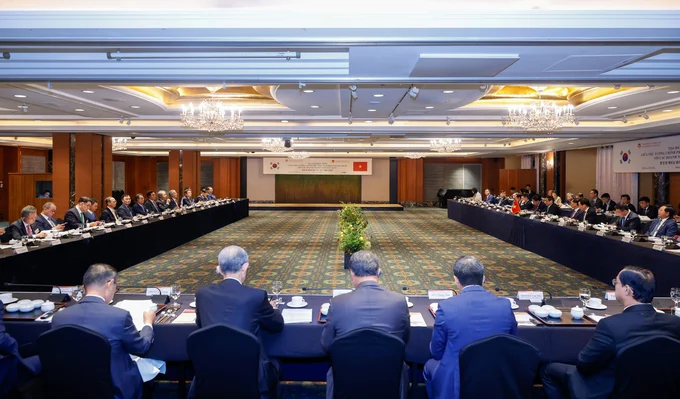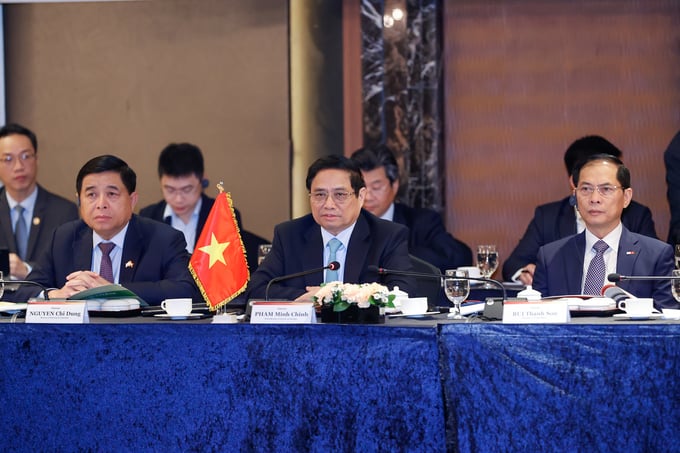November 26, 2025 | 09:49 GMT +7
November 26, 2025 | 09:49 GMT +7
Hotline: 0913.378.918
November 26, 2025 | 09:49 GMT +7
Hotline: 0913.378.918

Prime Minister Pham Minh Chinh held a discussion with leaders of nearly 20 leading Korean corporations. Photo: VGP.
During the seminar, Korean businesses presented their suggestions and recommendations, which were addressed by leaders of relevant ministries and branches in three main areas: Industry-Energy, Finance-Banking, and Information Technology-Medicine-Pharmacy-General Investment.
Mr. Han Seung-soo, former Prime Minister of South Korea and senior advisor at Kim & Chang Law Firm, noted that Korean companies are expanding their investments in all fields in Vietnam due to the special attention the Vietnamese Government has given to Korean enterprises. The trade and investment relations between the two countries have a solid foundation built on strong political and diplomatic ties, vibrant exchanges, and close connections between the two peoples.
Speaking to the Vietnamese delegation, Mr. Jung Yeoin, Chairman of Doosan Enerbility, stated that the group has been active in Vietnam since 2006 and is focusing on investing in various projects. The company expressed its desire to participate in wind power and gas power projects in Vietnam, providing power plant equipment such as turbines for these projects.
“Power generation is an important field of cooperation between the two countries. We are willing to transfer technology and provide professional training to Vietnam,” said Mr. Jung Yeoin.
Meanwhile, Hanwha Aerospace CEO Jung In Sup expressed interest in providing aircraft engine repair and maintenance services in Vietnam. According to him, Vietnam has many large airlines with significant demand for these services, but they currently have to send their aircraft to the US and Singapore for maintenance. Therefore, Hanwha Aerospace hopes to establish aircraft maintenance and repair operations in Vietnam in the near future.
Responding to investment issues, Minister of Planning and Investment Nguyen Chi Dung expressed hope that these corporations would expand their cooperation in Vietnam in three key directions: high-tech fields with high added value, digital infrastructure, and green transformation aligned with the green growth strategy, particularly in transportation and energy.
Mr. Dung affirmed that the Vietnamese Government is committed to supporting and is ready to remove obstacles to facilitate Korean businesses.
Regarding energy issues, Minister of Industry and Trade Nguyen Hong Dien emphasized Vietnam's significant need for energy and its efforts to attract investment in this sector. He mentioned that to ensure energy security under all circumstances, Prime Minister Pham Minh Chinh has directed six solutions, including improving the regulatory framework; applying a direct electricity trading mechanism; enhancing the rooftop solar power mechanism towards self-production and self-consumption; and reviewing and adjusting electricity prices according to market mechanisms.
Additionally, Vietnam is promoting investment cooperation in the field of new energy and hopes that Korean enterprises will invest in line with Vietnam’s development orientation.

The Prime Minister hopes that the two countries will promote “new cooperation horizons.” Photo: VGP.
Concluding the discussion, Prime Minister Pham Minh Chinh emphasized that the relationship between the two countries has never been better across all areas and is developing very dynamically and substantially. Numerous opportunities for bilateral economic cooperation continue to emerge.
Korea currently holds the No. 1 position in direct investment in Vietnam, with total accumulated capital reaching $87 billion across nearly 10,000 projects. Korea is also No. 2 in development cooperation and tourism, and No. 3 in labor and trade cooperation, with trade reaching $76 billion in 2023. The two countries aim to increase bilateral trade turnover to $100 billion in the near future and $150 billion by 2030.
Appreciating the opinions shared during the discussion, Prime Minister Pham Minh Chinh expressed his desire to listen to and value sincere and frank contributions. He emphasized his willingness to discuss recommendations, proposals, and practical cooperation initiatives from Korean corporations and businesses, many of which have already invested in Vietnam.
The Prime Minister welcomed and thanked the leading Korean corporations, expressing his hope that they would continue to expand their investment and cooperation with Vietnam. He highlighted the goal of promoting “new cooperation horizons” based on a “global, comprehensive, and all-people” approach, aiming for a bilateral trade turnover of $100 billion by 2025 and $150 billion by 2030.
Vietnamese leaders suggested that in addition to traditional fields of cooperation, both sides should strengthen their collaboration in developing the digital economy, green economy, circular economy, sharing economy, knowledge economy, and emerging industries such as artificial intelligence, within the context of the fourth industrial revolution.
The Prime Minister also urged Korean corporations to continue supporting Vietnam in various areas, including financial resources, infrastructure construction, improving institutions and policies, training high-quality human resources, and enhancing smart governance capabilities, both in corporate and national contexts.
Additionally, the Prime Minister requested that Korean investors continue actively participating in social security initiatives, supporting people during times of difficulty and natural disasters, especially those in remote, border, and island areas. He also called for support to help Vietnamese businesses integrate into the value chains of Korean enterprises and the global value chain.
Translated by Quynh Chi

(VAN) Deputy Minister Nguyen Quoc Tri emphasized the determination to prevent violations at CoP20, sharing enforcement results and commitments to strengthen cooperation with the international community in the coming period.

(VAN) In addition to strengthening the relationship between schools and enterprises, the Aus4Skills project expands opportunities for female students and people with disabilities to work in the transport and logistics sector.

(VAN) Nghe An is preparing policy, technical, and resource steps to participate in the forest carbon credit market.
/2025/11/25/1648-2-110733_532.jpg)
(VAN) From 2011 to 2023, Ca Mau province lost approximately 6,200 ha of coastal land and protection forests due to erosion, threatening many residential areas, infrastructure facilities, and production zones.

(VAN) Quang Ngai holds strong potential for carbon credits but needs a clear legal and policy framework to secure sustainable revenue from this resource.

(VAN) With its diverse ecosystem, Phu Quoc National Park plays a vital role in environmental protection and biodiversity conservation and serves as the core zone of the Kien Giang World Biosphere Reserve.

(VAN) Cooperation activities under the Aus4Skills program focus on: logistics professional development, competency-based training and assessment (CBTA), leadership innovation, and digitalization.